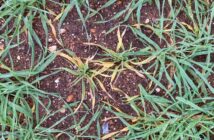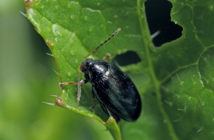Following reports of laboratory and field isolates of septoria tritici with reduced sensitivities to SDHI fungicides, a statement has been issued by Fungicide Resistance Action Group-UK (FRAG-UK).
What has been detected?
To date, many mutations which confer a change in sensitivity to SDHI fungicides have been detected in the field and from laboratory mutation studies. Not all of these mutations affect field performance.
The laboratory
There have been several examples of laboratory mutants of cereal pathogens showing reduced sensitivity to SDHIs. In 2012, extensive monitoring detected two septoria isolates (France and UK) and two isolates of net blotch (Germany) with sensitivities outside the baseline range. In 2013, isolates of net blotch with mutations conferring reduced sensitivity to SDHI fungicides were commonly detected throughout Europe, including the UK. In 2014, more of these isolates were reported and additional mutations were found.
The field
In November 2015, Rothamsted Research reported low frequencies of septoria isolates with reduced SDHI sensitivity in UK field populations. In December 2015, Teagasc in the Republic of Ireland confirmed the detection of field isolates of septoria with reduced sensitivity to the SDHIs. Some of these isolates had a mutation (C-H152R) in the SDHI target site which had not previously been detected in field isolates.
What are the implications for management?
Field performance from SDHIs is still anticipated to be good in 2016. However, strong stewardship is needed to prevent a rapid increase in the frequency of isolates with reduced sensitivity to SDHIs in the septoria population.
In view of these detections, it is crucial that fungicide programmes on wheat and barley adhere strictly to the guidelines on resistance management detailed in the full FRAG-UK statement.
Fungicide performance trials
Dr Paul Gosling, AHDB Research Manager, said: “AHDB supports the resistance action groups in their effort to provide evidence-based, independent and practical information on resistance management.
“FRAG-UK’s statement follows the release of our latest fungicide performance data at our Agronomists’ Conference last week.
“Our trials show that SDHIs remain the most active chemistry against septoria when applied in protectant situations.
“However, the new information on SDHI sensitivity, once again, shows why it is critical to adopt best resistance management practices.”



